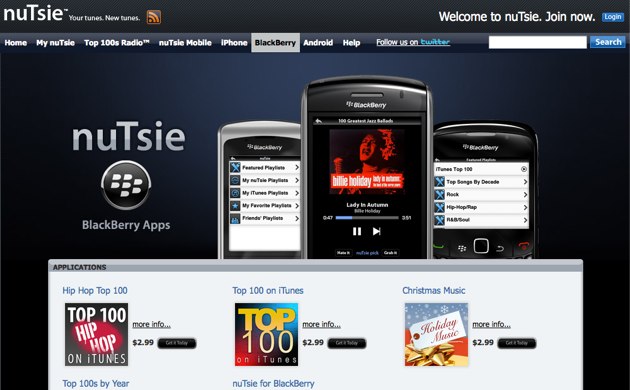HP is preparing for a major showdown with Apple. After snapping up the beleaguered Palm for $1.2 billion, Hewlett-Packard has purchased Melodeo, a Lala competitor, for roughly $30 to $35 million, according to a source familiar with the deal.
The acquisition, which was signed this month, may seem inconsequential for a behemoth like HP, but it represents a major shift in strategy for the laptop-maker. With Melodeo in its pocket, HP is now a player in mobile music services. Didn’t expect that did you?
What is Melodeo?
Similar to Apple’s Lala or Pandora, the Seattle-based Melodeo streams music to its mobile apps from the cloud. Melodeo’s main product line is nuTsie— yes, an anagram of iTunes. NuTsie’s flagship service (which is available on several platforms including Blackberry, Android and Windows Mobile) scans your iTunes playlists and allows you to access those playlists on your mobile device in shuffle mode. You can also look at other users’ playlists and discover songs through the company’s proprietary recommendation engine or nuTsie’s editorial playlists (i.e. Top 100 Reggae Songs, Top 100 90’s Songs).
The pricing depends on the wireless provider and the phone, for example, the Android app requires a one-time download fee of $9.95, meanwhile, some Verizon phones are $2.99 a month. The flagship service is not available on the iPhone, for the obvious reason that the iPhone comes with your iTunes library, but nuTsie does sell an assortment of playlist apps on the iPhone, like “Top 100 On iTunes,” and Effin Genius, an app that scans iTunes and creates new playlists based on your preferences and the songs you don’t own.

Melodeo is not as well known as many of its rivals like LaLa, Spotify, or Pandora, but it has a growing base of customers. According to sources, its website attracts a little over 2 million uniques a month and nuTsie apps have enjoyed 2 million downloads with roughly 60% being the flagship app.
Those numbers aren’t earth shattering but the real value of nuTsie is in its next iteration. The company is preparing to unleash nuTsie 3.0 across its platforms, a service that will let you take your entire, physical music library, from your desktop, and copy it into the cloud. You will be able to access any song on demand— unlike the older version, which ties you to the shuffle mode. The service works through a joint desktop and mobile app, allowing synchronous updates. By unlocking your entire iTunes library and making it essentially fully functional on several devices, Melodeo is presenting a serious challenge (or at least a sizable disruption) to Apple’s music business model.
Beyond its stellar design, part of the reason Apple has built such a loyal legion of iPod and iPhone users is the iTunes program. The more portable a user’s music library is, the easier it is for users to step outside the Apple ecosystem. With several companies frothing at the lips to take Steve Jobs down a peg, Melodeo was an attractive asset. Prior to the deal, Melodeo raised $7.9 million from Ignition Partners and Voyager Capital— amusingly, Ignition Partners was a major investor in LaLa. In the acquisition, HP did not throw down serious coin to be the victor, but there were multiple suitors, including HTC (also a serious suitor of Palm), according to a source familiar with the deal.
With Melodeo, HP also gets a key hire: David Billmaier, Melodeo’s VP of Product Marketing. Billmaier is a former Apple employee who worked for Jobs for more than a decade designing Apple products. Billmaier will fit in nicely with the growing collection of ex-Apple employees at HP. In its Palm acquisition, HP gained several former iPhone engineers and Palm CEO Jon Rubinstein (although it’s unclear how his position will shakeout in the wake of the takeover).
The question now is what will HP do with Melodio and what does it mean for their larger, mobile strategy.
Logically, I expect HP to launch the latest iteration of Melodio’s nuTsie application on every HP-Palm and Slate product, probably starting later this year. The other option is to take the basic technology and create an entirely new HP music experience around it, retire the nuTsie brand, and transition its users over to the new product once it is up and running.
The introduction of nuTsie should enhance the appeal of Palm’s operating system, WebOS. Forget about Palm’s mediocre stable of smartphones, WebOS will be the critical pillar in HP’s mobile strategy. As HP’s SVP of Strategy and Corporate Development Brian Humphries recently told TechCrunch: “Our intent is to double down on WebOS.”
Unfortunately, HP is more than than fashionably late to the mobile party— but, at the very least, the company is cognizant of its tardiness. As evident from its recent acquisitions, HP is not wasting any time trying to build new products from within. They have correctly concluded that if they’re going to go full throttle on mobile, now is the time. So what HP wants— HP will buy. It will be interesting to see if this is just the beginning of HP’s shopping spree.
Update: HP and Melodeo have confirmed the deal.
From HP:
HP confirms that it has acquired Melodeo, a privately-held company that provides cloud-based delivery systems for content across multiple devices.
HP’s acquisition of Melodeo is another example of our efforts to bring new, innovative technologies to market. We are excited about the potential of this technology to bring the power of cloud-based delivery services to millions of customers.
